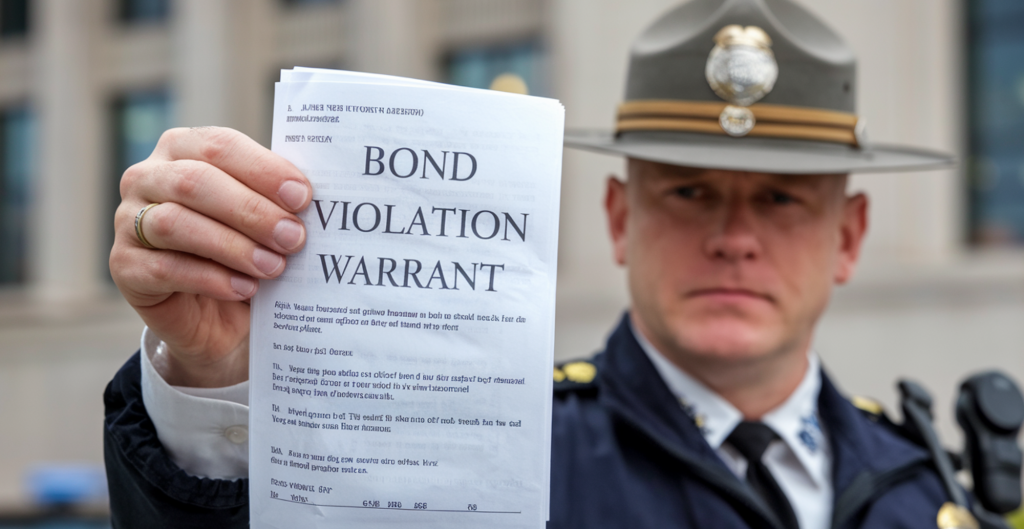What do I do about a Bond Violation?
If a judge has granted you bail on a felony or misdemeanor charge, you must comply with the terms and conditions of your bond. Bond conditions can be confusing and complicated to follow.

What happens with a bond violation?
When someone faces a felony or misdemeanor charge, they are entitled to be released on bail until the resolution of their case. Release on bail means that before adjudication, such as dismissal, conviction, or acquittal, a defendant is released from jail but ordered to comply with the terms and conditions of a bond. A bond can require a cash deposit, a bondsman, or a promise to appear in court. A bond requiring nothing more than a promise to appear and follow the law is called a personal bond. The arraigning judge or magistrate will order a defendant to comply with various bond conditions, such as not leaving Michigan, not possessing firearms, or continuing mental health therapy. If someone allegedly fails to comply with a bond condition, they can face a bond violation charge.
How would someone know if they’ve violated their bond?
The procedure in most courts is to mail or email a defendant a notice if they’ve allegedly violated their bond order. If a lawyer represents someone, the lawyer generally gets notice of a bond violation allegation or show cause hearing. A bond violation or show cause hearing is an evidentiary hearing requiring the prosecutor to prove by a preponderance of the evidence that the defendant failed to comply with their bond conditions. A “show cause hearing” requires the defendant to prove there is a reason not to find they’ve violated their bond.
How to Defend Against a Bond Violation Charge
A defense lawyer can defend a client based on the facts, the law, and based on equity. A great defense lawyer will do all three simultaneously. Here is what you need to know:
- The Facts – The defendant might have followed the bond conditions perfectly. In other words, they may have done everything required of them and refrained from doing anything prohibited. A fact-based bond violation can result from a misunderstanding, a false allegation, or a genuine error. For example, a defendant might have consumed vanilla extract and then falsely tested positive for consuming an alcoholic beverage.
- The Law – An illegal, unconstitutional, vague, or impossible bond condition is unenforceable. For example, a bond condition preventing someone from using medically necessary marijuana is unenforceable. A bond that requires someone to avoid contact with law enforcement is unconstitutionally vague and overbroad. A defense grounded on a statute, precedent, or court rule is a law-based defense.
- Equitable Defense – Sometimes, a bond violation is unfair under the circumstances. For example, judges typically order defendants not to submit diluted urine samples. If someone drinks excessive water, their urine will be too watery for drug and alcohol testing. Suppose someone drinks a lot of water before their arraignment. At the hearing, the judge orders them to immediately drug test. In that case, they drank the water prior to the judge’s order. A violation based on a diluted urine sample would be unfair because the defendant had no way of knowing not to drink water before the court hearing. Equity is the best defense if the defendant technically violated a bond condition but did everything reasonable to comply with the court order.
The best defense to bond violations is often legal, factual, and equitable simultaneously. A skilled, experienced criminal defense lawyer can evaluate available options and formulate a successful strategy.
Plead Guilty But Remain on Bond
A lawyer’s best strategy might be to help their client remain free if they unequivocally violate their bond. A bond violation does not require incarceration. A judge can give a defendant a second chance or modify the bond instead of revoking it or raising the bail amount. A reputable defense lawyer with well-known credibility provides the best odds of a defendant remaining free on bond despite a bond violation. Arguing for the continuance of a bond is an art form, not a technical exercise. The Defense Team with LEWIS & DICKSTEIN, P.L.L.C. has decades of experience mitigating bond violations and persuading judges to exercise leniency on bond violations.
Examples of clear bond violations are as follows:
- consuming alcohol or drugs
- failing to appear in court
- going to visit with a complainant (victim) in a domestic violence case with a “no contact” order
- leaving Michigan for an unapproved vacation

Frequently Asked Questions
What happens when you violate bond Michigan?
The court will send you or your lawyer a notice to appear for a bond violation hearing or a show cause if you are accused of a bond violation. You will have the option of pleading guilty or requesting a hearing. If you are found not guilty of a bond violation, the judge dismisses the violation. If the defendant is found guilty, the judge can keep the bond the same, increase it, or cancel it and remand them into custody.
What does “violate bond” mean?
“Violate Bond” means a defendant failed to do something ordered by the judge as a condition of their bond, or they did something in violation of a court order.
What are the most common bond violations?
- drinking or possessing alcohol
- consuming non-prescription drugs
- violating a “no contact” order
- a new arrest or conviction
- failing to report as instructed
- not showing up for a court hearing
- leaving the state without court permission
- possessing firearms
- providing a diluted urine sample
- missing a drug or alcohol test
- testing late for drugs or alcohol
- failing to appear for a presentence investigation interview
- consuming a product that causes a false positive drug or alcohol test
How long do you stay in jail for a warrant for missing a court date in Michigan?
A judge can issue a warrant if a criminal defendant misses court. Once arrested, the defendant will typically stay in court until the judge arraigns them and their retained criminal defense lawyer secures their release from custody. It can take several days to get an arraignment hearing. In serious cases or cases with multiple bond violations, a judge can cancel the defendant’s bond altogether and remand them into custody for the duration of the case.
Can you bond out on a probation violation in Michigan?
A defendant can be released on bond if facing a probation violation.

What is a bond violation hearing?
A bond violation hearing is a court procedure to determine if a defendant failed to follow the terms and conditions of their bond order. The prosecution must prove by a preponderance of the evidence the defendant violated the bond.
How does a judge determine if there is a bond violation?
The judge determines if there is a bond violation by holding a hearing. The prosecutor and defense lawyer admit evidence and testimony regarding the allegations, and the judge must decide if the prosecution proves them. The Rules of Evidence do not apply at a bond violation hearing.
What is a bond show cause hearing?
A show cause hearing is similar to a bond violation hearing. Some courts use different terminology for similar hearings. The prosecutor must demonstrate that the defendant violated their bond at either hearing.
If a judge remands a defendant or drastically increases their bail amount, is it too late for a lawyer to help?
If a defendant goes to court for a bond violation and the judge increases their bond or remands them to custody, it is not too late for a qualified attorney to file a Motion for Bond Reduction. If an appointed attorney, inexperienced lawyer, or general practice attorney fails to persuade a judge to continue their client’s bond, a newly retained attorney can step in and file a motion to re-address the bond issue.

Top Attorneys for Bond Violations and Criminal Defense
Do not trust your fate with the lowest bidder when you face a bond violation allegation. If you have an attorney and are not confident in their representation of you, that is probably a sign that you need a new lawyer. You are constitutionally entitled to switch attorneys whenever you believe a change is in your best interest. A bond violation allegation means that your liberty is at risk. Most judges will not hesitate to raise your bail amount or remand you to custody if you are not complying with the bond order. The Defense Team at LEWIS & DICKSTEIN, P.L.L.C. has decades of experience helping clients charged with felonies, misdemeanors, and bond violations. Call us for a free consultation, and we will take the time to talk with you, answer your questions, and work with you to develop a winning strategy. If you have a lawyer but are not confident you are receiving the best possible representation, we are available to help you.
Call us today at (248) 263-6800 for a free consultation or complete an online Request for Assistance Form. We will contact you promptly and find a way to help you.













